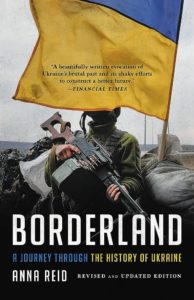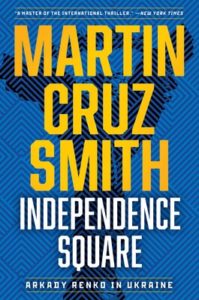If you want to understand the conflict in Ukraine and go behind the headlines, there’s no better place to start than Anna Reid’s Borderland: A Journey Through the History of Ukraine. Deeply researched, elegantly written, totally enthralling, the book explores the history of Ukraine back to the Vikings and how Ukraine and Russia have followed completely different paths.
Unlike Russia, which became an autocratic empire, Ukraine has been ruled and misruled by Poland, Lithuania, Austria-Hungary and of course Russia. A key to the current slaughter of Ukrainians and the seizure of vast swathes of territory–as well as what sounds like crazy rhetoric on Russian talk shows–is a profound Russian delusion about this country that hasn’t been independent very long but has an undeniable historic existence, culture, and language. Reid notes that historically Russians have regarded
Ukrainians as really just a subspecies of Russian…Any differences that did demonstrably exist between them were the artificial work of perfidious, Popish Poles–replaced in today’s Russian imagination by the meddling West in general. Rather than attacking Ukrainians and Ukrainian-ness as inferior, therefore, Russians deny their existence. Ukrainians are a “non-historical nation,” the Ukrainian language a joke dialect, Ukraine itself an “Atlantis–a legend dreamed up by Kiev intellectuals”…The very closeness of Ukrainian and Russian culture, the very subtlety of the differences between them, is an irritation.
That was written in the 90s; now the irritation appears to have turned to seething hatred.
Blending history, personal exploration, and interviews, the book is unique because it is divided into two parts: the first was published in 1997 90s when a democratizing Russia under Yeltsin seemed highly unlikely to attack its neighbor. The second, of course, was written after Putin launched his “special military operation” at a time when Russia seems like a fascist state to many international analysts–and certainly to Ukrainians who have experienced fascism under the Nazis.
Reid doesn’t pull any punches exploring Ukrainian antisemitism and pogroms or the country’s lack of readiness to face up to the truth the way Germany has done about the Holocaust. Nor does she whitewash past governmental and cultural corruption. Reid is especially adroit at discussing how Ukrainian nationalism has been growing stronger and investigating the role of the Ukrainian language in a country where many people have been bilingual and Ukrainians have Russian relatives and marriages are often “mixed.”
If you’ve read Bloodlands by Timothy Snyder, Reid’s book is a perfect companion piece, vitally important work that has been superbly edited and updated. ★★★★★
Lev Raphael is the author of 27 books in genres from memoir to mystery and his work has appeared in over a dozen languages. He has reviewed books for The Detroit Free Press, The Washington Post and a handful of public radio stations.


